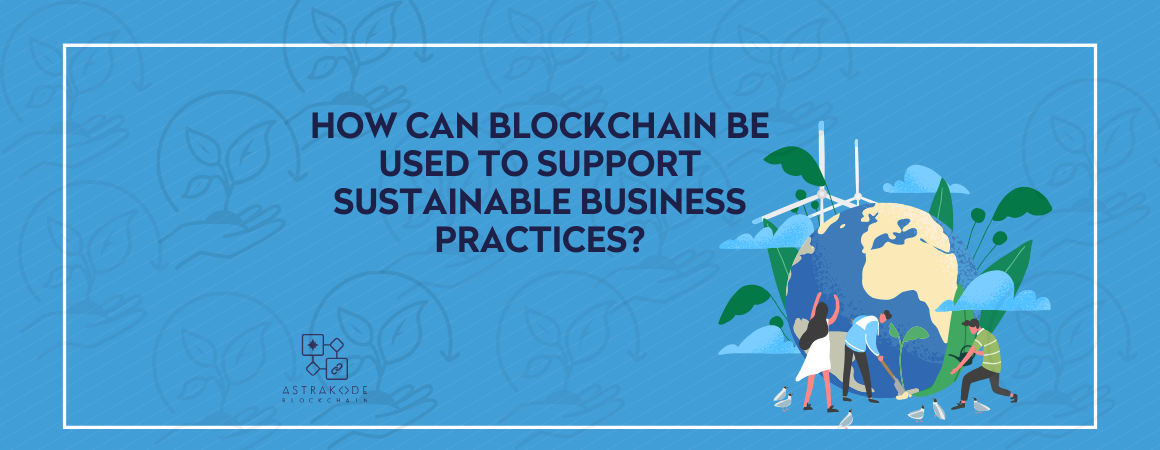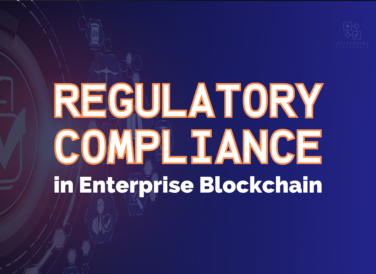
Blockchain: a Beginner’s Guide to Understanding This Revolutionary Technology
Welcome to the exciting world of blockchain! If you’ve ever wondered what this revolutionary technology…

Sustainable business practices are vital strategies that companies adopt to benefit society, the environment, and the economy. They focus on social responsibility, environmental stewardship, and economic longevity. The main goals are to minimize environmental impact, promote social equity, and drive economic growth while maintaining transparency and efficient resource use. As sustainability becomes a priority for modern consumers and investors, businesses are turning to innovative solutions like blockchain technology for assistance in managing and reporting sustainable practices.
Sustainable business practices are foundational to modern enterprise, driven by the core objectives of minimizing environmental impact, promoting social equity, and driving economic growth. By reducing waste, conserving resources, and lowering emissions, businesses play a crucial role in protecting our planet. These practices are not only about environmental stewardship but also about fostering a more equitable society. Fair labor practices, community engagement, and a diverse and inclusive workforce are integral to promoting social equity.
Furthermore, sustainable practices contribute to economic growth by generating profits responsibly and bolstering the economies of the communities they serve. A robust sustainable business strategy, therefore, encompasses these facets, striving for a balance that benefits both the planet and its inhabitants. For further insights into these objectives, the United Nations Global Compact provides a set of principles guiding businesses towards sustainability. The 17 UN Sustainable Development Goals (SDGs) established in the 2030 Agenda reflect a comprehensive plan to achieve sustainability, addressing key global challenges across economic, social, and environmental dimensions, and urging collaborative action towards a sustainable and prosperous future for all.
Implementing these sustainable business practices involves a multi-faceted approach. Efficiency in resource use is critical; optimizing operations can significantly reduce a company’s environmental footprint and costs, as outlined by the Environmental Protection Agency (EPA).
Blockchain technology is uniquely positioned to strengthen sustainability efforts across various sectors. The following key attributes of blockchain are instrumental in advancing sustainable practices:
The decentralized nature of blockchain further democratizes data management, allowing multiple parties to contribute to and access sustainability records without a central point of control, which is pivotal for collective action in environmental conservation.
Blockchain’s distributed ledger provides a transparent record of transactions or data entries, which is accessible to all participants. This can be used to track the provenance of products from origin to consumer, ensuring that sustainability claims are accurate and reliable.
Once recorded, the data on a blockchain cannot be altered or deleted. This provides an immutable audit trail of sustainable practices, which can be critical for regulatory compliance and consumer trust.
Blockchain’s smart contract functionality automates the execution of agreements within the sustainability framework, ensuring that predefined conditions related to environmental impact or social responsibility are met before any transaction is completed. This self-executing contractual agreement reduces the need for intermediaries, streamlines operations, and enhances resource efficiency.
Blockchain’s tokenization capacity transforms natural assets into digital forms, broadening market access and creating new avenues for sustainable investment. This way, tokenization promotes market efficiency and liquidity, enabling more inclusive financial participation. This indirectly benefits sustainability by facilitating funding and trading opportunities for environmental projects, driving the growth of a more sustainable economy.
Tokenization notably finds its application in carbon credits. These credits, which represent a measure of CO2 emissions reduction, can be tokenized on blockchain platforms for better traceability and integrity. This process aids in the transparent and efficient trading of carbon credits, encouraging eco-friendly initiatives and wider investor participation.
The cryptographic nature of blockchain ensures a high level of security for transactions and data, which is essential for protecting sensitive information related to sustainability efforts.
Blockchain can track the lifecycle of products, from raw materials to finished goods, providing insights into the environmental impact and social conditions under which goods are produced.
With the right standards in place, blockchain systems can work across different organizations and sectors, facilitating collaboration on sustainability initiatives.
Blockchain can aid in meeting regulatory compliance by providing an indisputable record of compliance-related data. It enables real-time monitoring and reporting, which can be crucial for businesses that need to adhere to environmental, social, and governance (ESG) regulations. The technology can also assist in automating the compliance process, reducing the burden of manual reporting and increasing the accuracy of the data submitted to regulators. By facilitating a more transparent and accountable compliance framework, blockchain can help ensure that sustainability standards are met and validated, thus contributing to the overall integrity of sustainable business practices.
For instance, the “EU Deforestation Regulation” requires companies to conduct due diligence on their supply chains to ensure products are not linked to deforestation. Blockchain can provide an efficient way to trace supply chains and verify compliance with such regulations.
Other notable regulatory frameworks include:
These examples, among others, highlight blockchain’s role in not only ensuring compliance but also in fostering a transparent and accountable business environment.
Blockchain is being utilized across industries to foster sustainability, showcasing its versatility and potential for creating a more eco-conscious future. Here are some compelling real-world applications:
Blockchain enables platforms like WePower to disrupt the traditional energy market. It allows for the tokenization of energy, giving consumers and producers a transparent and efficient way to interact and transact, fostering the growth of green energy.
Adding to the advancement, in Spain, Siemens Energy’s e-ing3ni@ platform furthers this transformation, allowing users to select, trade, and manage renewable energy online, leveraging blockchain’s secure and transparent capabilities.
The responsible sourcing of minerals is critical to ethical manufacturing. Everledger leverages blockchain to ensure minerals are ethically sourced, free from child labor or conflict, contributing to more ethical supply chains and sustainable business practices.
Blockchain platforms, including IBM Food Trust, are ensuring the traceability of food from farm to table. This traceability is crucial for verifying food safety and sustainability, enabling consumers to make informed decisions based on reliable data.
On the other hand, platforms like, AstraKode offers a pre-built, drag-and-drop template specifically designed for the Agri-Food Supply Chain. This allows businesses to customize and launch their own blockchain solutions with ease.
Sign up free to discover how AstraKode Blockchain can transform your supply chain operations.
In the fashion sector, initiatives like The Fashion for Good platform use blockchain to verify the authenticity of recycled materials and track garment lifecycles, promoting a more sustainable fashion industry.
Innovative applications are improving waste management and recycling processes. Plastic Bank is an example where blockchain secures and validates the exchange of recyclable plastics for tokens, incentivizing recycling and helping to reduce plastic waste.
Additionally, the BM Food Trust initiative applies blockchain to manage food waste, ensuring compliance and improving waste reduction strategies. Similarly, Coca-Cola Africa’s collaboration with BanQu empowers recycling collectors in South Africa through transparent blockchain transactions, fostering financial inclusion and bolstering the circular economy. These use cases exemplify blockchain’s pivotal role in innovating sustainability across the waste management spectrum.
Blockchain is ensuring that building materials meet sustainability credentials through platforms like Provenance, which supports green building standards and promotes sustainable construction practices.
As businesses across the globe increasingly embrace sustainable practices, the ESG (Environmental, Social, and Governance) criteria have become a standard for measuring a company’s commitment to operating responsibly. The integration of blockchain technology with ESG is a forward-thinking approach that enhances transparency, accountability, and efficiency in reporting on these critical areas.
Especially in today’s market where ‘greenwashing’, the practice of making misleading claims about the environmental benefits of a product, service, or company to appear more environmentally friendly than it is, has become a significant issue, the immutable and tamper-proof nature of blockchain technology has become essential. In a recent AstraKode survey of 96 participants, 34.4% identified greenwashing as a pressing issue in the sector. This highlights the need for technologies like blockchain, which can provide verifiable and transparent records to ensure the accuracy and trustworthiness of sustainability claims.
Blockchain’s immutable ledger offers a powerful tool for environmental tracking, ensuring that a company’s ecological impact is accurately recorded and managed. Socially, blockchain can provide undeniable proof of fair labor practices and ethical supply chains, promoting social equity and community engagement. From a governance standpoint, blockchain enables the secure management and sharing of information, which is crucial for regulatory compliance and fostering trust among investors and stakeholders.
Initiatives that combine blockchain with ESG are gaining traction. Projects like Open Earth Foundation are pioneering this integration to address climate change and drive sustainability. Similarly, platforms like EcoChain focus on environmental accounting on the blockchain, helping businesses minimize their carbon footprint. These initiatives are just the beginning of what promises to be a widespread adoption of blockchain in ESG reporting and management, setting a new standard for corporate sustainability.
As blockchain technology evolves, its integration with sustainability efforts is becoming more profound. The future holds promising advancements such as:
Fundamentally, carbon credits merge environmental responsibility with market mechanisms, therefore encouraging companies to innovate and reduce their carbon footprint. This approach contributes significantly to global sustainability efforts.
The adoption of blockchain in sustainability is gaining momentum, with the potential to transform how businesses manage their environmental impact. It is a call to action for businesses and innovators to harness blockchain as a transformative tool for sustainable development.
For those ready to delve deeper and tailor blockchain solutions to their unique challenges, AstraKode offers expertise and support. Book a free consultation with our specialists today and begin charting your course towards sustainability with confidence and precision.

Welcome to the exciting world of blockchain! If you’ve ever wondered what this revolutionary technology…

Blockchain technology has emerged as a powerful tool for businesses, enabling secure and transparent transactions…

In the vibrant landscape of blockchain technology, smart contracts have emerged as a game-changing innovation,…